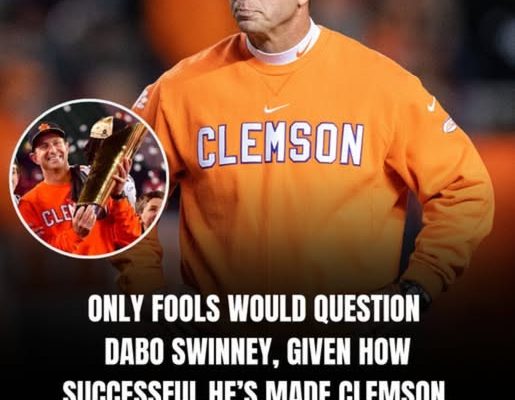The world of college football is known for its intensity, passion, and, at times, impatience. Fans expect excellence year after year, and when a powerhouse program stumbles out of the gate, whispers and debates about the head coach’s future immediately begin to circulate. This has been the case at Clemson University, where the Tigers’ 1–2 start to the season has fueled chatter that head coach Dabo Swinney might be on the hot seat. However, not everyone is buying into the narrative. Analyst Mitchell, a respected voice in the college football community, stepped forward to shoot down the speculation, insisting that Clemson’s struggles are not a reflection of Swinney’s job security or overall ability to lead the Tigers.
A Rocky Beginning to the Season
Clemson’s first three games of the season have been far from the dominant performances fans have grown accustomed to over the past decade. A 1–2 start is not what anyone in orange and purple envisioned, particularly for a program that has set such a high standard under Swinney. The Tigers have been a fixture in the College Football Playoff conversation, and their résumé over the last decade includes multiple national championship appearances and two national titles. In recent years, Clemson has produced NFL-caliber quarterbacks, elite defenses, and a reputation for being one of the sport’s most stable dynasties.
But football, like all sports, runs in cycles. Even the greatest programs endure setbacks. Early-season losses have not only been disappointing but have also opened the door to harsh criticism from fans and commentators alike.
The Rumors Begin
Whenever a college football giant falters, the conversation inevitably shifts toward leadership. In the fast-paced media environment of today, speculation spreads like wildfire. After Clemson dropped its second game of the season, several outlets and fan forums began discussing the possibility of Dabo Swinney being pushed out if the Tigers could not quickly right the ship.
Such rumors often stem from the passion and impatience of fans who have become accustomed to success. Clemson has raised expectations so high that a 1–2 start feels like a full-scale crisis. Comparisons to previous dynasties like Alabama or Ohio State are quickly drawn, with critics questioning whether Swinney’s era of dominance is beginning to fade.
Analyst Mitchell Pushes Back
Amid the noise, Analyst Mitchell cut through the speculation with a clear and firm dismissal. According to Mitchell, it is absurd to suggest that Swinney’s job is in jeopardy after a couple of early-season setbacks. He reminded fans and observers of Swinney’s extraordinary track record: national championships, conference dominance, and the transformation of Clemson from a good program into one of college football’s most feared forces.
Mitchell emphasized that coaches of Swinney’s caliber do not suddenly lose their ability to lead a team. He noted that even the most successful programs occasionally hit rough patches. Nick Saban’s Alabama, for example, has suffered early-season losses in the past but always bounced back into contention. The idea that one shaky start could erase years of excellence, Mitchell argued, is not only unfair but also unrealistic.
Why Swinney’s Legacy Still Matters
Dabo Swinney is more than just Clemson’s head coach; he is the architect of the modern Clemson Tigers. Before his arrival, Clemson football had a proud history but was not seen as a perennial contender for national championships. Swinney changed that. Under his leadership, Clemson captured the 2016 and 2018 national titles, produced Heisman-caliber talent, and recruited some of the best athletes in the country.
Beyond the trophies and accolades, Swinney also built a culture centered around accountability, positivity, and belief. His motivational style has become a signature aspect of Clemson’s identity. Analyst Mitchell argued that this foundation cannot be dismissed just because of a 1–2 start. Programs with deep roots and strong leadership rarely collapse overnight.
The Realities of Modern College Football
Another point Mitchell raised is that modern college football is more competitive than ever. With the transfer portal, NIL deals, and constant roster turnover, maintaining dominance year after year has become increasingly difficult. Even powerhouse programs face challenges in adjusting to the ever-changing landscape. Swinney himself has been somewhat cautious in his embrace of the transfer portal, a choice that has sparked debate. Yet Mitchell suggested that Clemson’s struggles are more a reflection of the evolving environment than an indication that Swinney is incapable of adapting.
It is also worth noting that other blue-blood programs have endured rough starts in recent years. Oklahoma, Texas, and even Alabama have had their fair share of early-season hiccups. In each case, the programs eventually recalibrated and reasserted themselves as contenders.
Fan Expectations vs. Reality
The impatience of college football fans is understandable. When a program like Clemson raises the bar so high, even a single loss can feel catastrophic. However, Analyst Mitchell’s commentary served as a reminder that the standard should not become so unrealistic that it blinds people to reality. Winning national championships is hard. Remaining a consistent contender for more than a decade is even harder. Dabo Swinney has achieved both.
The danger of overreacting is that it risks destabilizing a program that has been remarkably consistent under Swinney’s leadership. If fans and boosters buy into the idea that one rough season warrants a coaching change, they risk undermining the very culture that has delivered so much success.
For Clemson, the season is far from over. At 1–2, there are still plenty of opportunities to turn things around. Conference play offers a chance for redemption, and the Tigers are more than capable of stringing together wins to reassert themselves in the ACC. Swinney has faced adversity before and has consistently shown the ability to rally his teams.
Analyst Mitchell expressed confidence that the Tigers will improve as the season progresses, emphasizing that it is premature to count out a coach and a program with such a strong pedigree. While the College Football Playoff might be a long shot this year, Clemson still has the chance to prove its doubters wrong and set the foundation for future success.
Speculation and rumor are inevitable in college football, especially when a powerhouse program stumbles. But Analyst Mitchell’s dismissal of the idea that Dabo Swinney could be fired is a powerful reminder of the importance of perspective. A 1–2 start does not erase national championships, years of dominance, or the cultural transformation Swinney has brought to Clemson.
The Tigers may be facing challenges, but they are far from a program in crisis. With Swinney at the helm, Clemson has every reason to believe that brighter days are ahead. Patience, perspective, and faith in proven leadership may be exactly what the Tigers need right now.
In the fast-moving world of college football, it is easy to overreact. But as Mitchell so clearly pointed out, dismissing Swinney after all he has built would not only be misguided — it would be a disservice to one of the greatest coaching legacies in modern college football.



